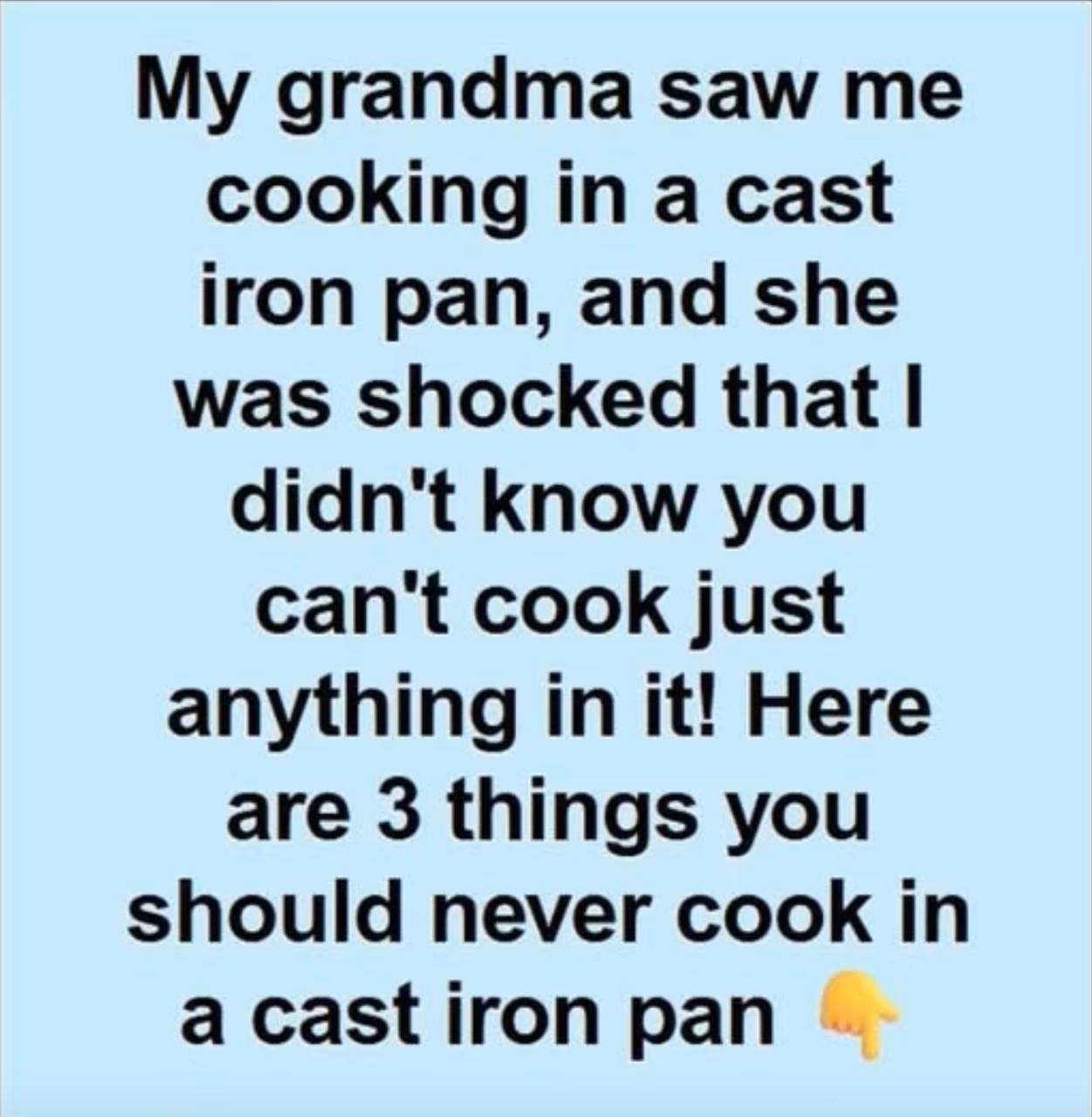Cast iron skillets are a beloved staple in many American kitchens, known for their incredible durability, superior heat retention, and timeless appeal. When properly cared for, these pans can last a lifetime and even be passed down for generations, developing a unique seasoning that enhances flavors with every use.

From crispy cornbread to perfectly seared steaks, a cast iron skillet can handle countless dishes with ease. But despite its versatility, not every ingredient or cooking method is suited for cast iron. Some foods can damage the pan, strip its seasoning, or leave behind unpleasant flavors that linger long after the meal is done, making it crucial to know what to avoid when using this type of cookware. One of the worst offenders is acidic food. Ingredients like tomatoes, vinegar-based sauces, or citrus-heavy recipes can break down the skillet’s hard-earned seasoning, leaving a metallic taste in your food.
While a quick sauté of tomatoes in a well-seasoned pan might not cause harm, long-simmering dishes such as tomato stews, chili, or lemon-braised chicken can strip away the protective layer and even react with the iron itself. For these types of meals, stainless steel or enameled cookware is a safer bet to protect both your dish’s flavor and your pan’s finish. Another food that doesn’t fare well in cast iron is delicate fish. Varieties such as tilapia, flounder, or sole are too fragile for the rough surface and high heat cast iron provides. These fish tend to stick, fall apart during cooking, and often leave strong odors that cling to the skillet, affecting the taste of whatever you make next.
Nonstick or stainless steel pans are far better suited for these flaky fillets, ensuring you get a clean release and avoid flavor transfer to future meals. Sticky or sugary sauces like teriyaki, honey garlic glaze, or caramelized dishes should also be avoided unless your cast iron skillet is exceptionally well-seasoned. Sugar burns quickly on cast iron, sticking aggressively to the surface and creating a stubborn mess that’s hard to clean without damaging the seasoning.
This not only ruins the sauce but also compromises the pan’s nonstick properties, potentially undoing months of careful maintenance. For these meals, nonstick cookware offers better control and easier cleanup. Eggs are another tricky food, especially for beginners. While experienced cast iron users with a perfectly seasoned pan can make scrambled eggs or omelets without issue, most people end up with a sticky, glued-on mess that can ruin breakfast and make cleanup a chore. Until your skillet has developed a smooth, glossy finish and you’ve mastered oil and heat control, nonstick pans remain the best choice for eggs.
Strongly aromatic foods, such as garlic-heavy stir-fries, fish-based dishes, or spicy curries, can leave lingering odors in your skillet because cast iron retains flavors. If you switch immediately to baking something sweet, like cookies or cobbler, you may notice an unpleasant savory aftertaste. Many cast iron enthusiasts keep separate pans for savory and sweet dishes or deep-clean their skillet thoroughly after pungent meals to avoid this problem. High-moisture cooking methods are also not suitable for cast iron. Boiling pasta, steaming vegetables, or simmering water-based dishes for extended periods can erode the seasoning and even lead to rust formation.
Cast iron is designed for dry heat cooking—frying, baking, roasting—not prolonged exposure to water. For boiling and steaming, stainless steel or enameled pots are much better options. Another important thing to avoid is storing food directly in your cast iron skillet. The moisture and acidity in leftovers can damage the seasoning, cause rust, and alter the taste of the food itself. Always transfer your meal to another container once cooled, and wash, dry, and oil your pan right away to keep it in prime condition. Perhaps the most damaging mistake is exposing a hot cast iron skillet to cold water, which can cause thermal shock, leading to warping or even cracking the pan. Similarly, placing cold food straight from the fridge into a sizzling-hot skillet can stress the metal and weaken its integrity.
Allow your pan to heat up and cool down gradually to prevent damage. To keep your cast iron skillet performing at its best, always dry it thoroughly after washing, apply a thin coat of oil to maintain the seasoning, avoid harsh soaps unless necessary, and store it in a dry place to prevent rust. With the right care and by avoiding these common pitfalls, your cast iron skillet can remain a reliable kitchen companion for decades, delivering flavorful meals while becoming a cherished tool passed down through generations.





